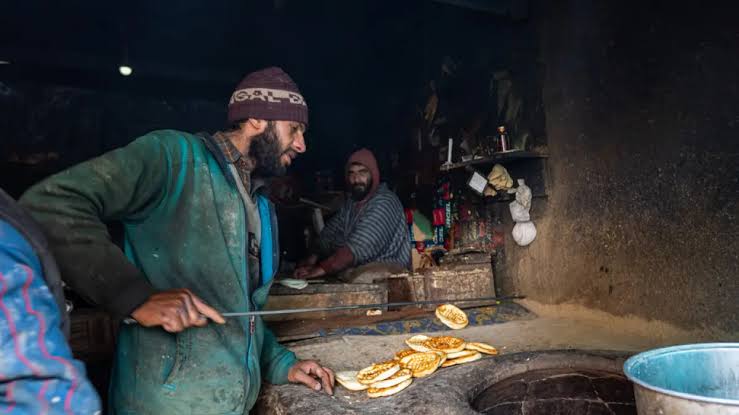Kashmiri Kandur Tchout Prices Double: Outrage Mounts as Staple Bread Becomes Costlier
By: Javid Amin
Srinagar, December 25, 2024 – A sharp rise in the price of the beloved Kashmiri bread, Kandur Tchout, has left residents of the Valley grappling with frustration and financial strain. The traditional bread, cherished for its pairing with Kashmiri Nun Chai and an essential part of daily life, has seen its price double from Rs 5 to Rs 10. This sudden increase has sparked widespread concern, particularly among low-income families already struggling to meet their basic needs amidst soaring living costs.
A Tradition at Risk: The Significance of Kandur Tchout in Kashmiri Culture
Kandur Tchout is more than just bread; it’s an integral part of Kashmiri culture and cuisine. Traditionally baked in wood-fired ovens by kandurs (local bakers), this bread has a deep connection with the Valley’s identity. Whether paired with the soothing pink Nun Chai for breakfast or enjoyed with curry during lunch, Kandur Tchout has been a symbol of comfort and sustenance for generations. Its affordability has long made it accessible to every household, regardless of income.
However, with the price doubling overnight, many fear that this cherished tradition may now be out of reach for economically vulnerable families.
The Bakers’ Perspective: Rising Costs and Economic Pressures
Defending the price hike, the Kashmir Bread Makers and Bakers Union, led by its president, Sofi Abdullah Majeed Pampori, pointed to the soaring cost of essential ingredients like flour, ghee, and fuel. Labor expenses have also risen significantly. Pampori explained that bakers across the Valley had no choice but to increase prices after thorough deliberation.
“The cost of production has skyrocketed. Flour prices alone have risen by over 30% in the past year, and labor costs have doubled. This decision was not made lightly. We communicated our reasons to the authorities beforehand, and bakers reserve the right to adjust prices to stay afloat,” Pampori stated.
According to bakers, the increase is necessary to maintain the quality of the bread. Without it, they claim, sustaining their businesses in the current economic climate would be impossible.
Public Outrage: “A Price Hike Too High to Bear”
For many Kashmiri families, the hike has been a bitter pill to swallow. Residents argue that while they understand the economic pressures faced by bakers, the doubling of prices is excessive and disproportionately impacts those with limited incomes.
Kulsum Jan, a homemaker from Beerwah, expressed her frustration:
“We used to buy five rotis for Rs 25; now it costs Rs 50. This is beyond our budget. A smaller increase—perhaps from Rs 5 to Rs 7—would have been more reasonable. But doubling the price is unacceptable.”
Daily wage workers, like Sajad Ahmad from Srinagar, are feeling the pinch even more.
“For someone earning Rs 200 to Rs 300 a day, spending Rs 50 on bread alone is unsustainable. Winter is already a tough season with additional heating costs. The government must step in to regulate prices and ensure essentials remain affordable for everyone.”
The Bigger Picture: Inflation’s Grip on the Valley
The price hike of Kandur Tchout is part of a broader trend of rising living costs in Kashmir. Inflation has affected everything from fuel and electricity to basic groceries. For residents, this bread price increase is another strain on already stretched household budgets.
Experts point to several reasons behind the rising costs in the region:
- Inflation in Raw Materials: The global rise in wheat and ghee prices has trickled down to local markets.
- Supply Chain Challenges: The harsh winter months disrupt transportation, leading to higher logistical expenses.
- Economic Instability: Ongoing socio-political issues and economic slowdowns have further compounded the problem.
Government’s Role: Intervention Needed to Regulate Prices
Calls for government intervention are growing louder. Residents are urging authorities to step in and mediate between bakers and the public to set a fair, affordable price for Kandur Tchout. While market dynamics typically dictate prices, in a region like Kashmir, where socio-economic vulnerabilities run high, the government’s role in regulating essentials is deemed crucial.
Consumer rights advocate Mehraj-ud-Din emphasized the need for immediate action:
“Bread is a staple; it’s not a luxury. The government must assess production costs and ensure that prices remain within reach for the average family. Subsidies on raw materials like flour could help bakers and keep prices stable.”
Balancing Economic Realities with Cultural Heritage
Kandur Tchout is more than food—it’s a symbol of resilience and community. In these challenging times, striking a balance between the economic realities of bakers and the needs of the public is essential to preserve this cultural treasure.
Suggestions for potential solutions include:
- Government Subsidies: Providing subsidies on raw materials to bakers.
- Transparent Pricing: Engaging consumer groups and bakers in price-setting discussions.
- Community Support: Encouraging community initiatives like bulk buying to reduce costs.
The Road Ahead: Preserving Accessibility to Kandur Tchout
As Kashmiris navigate these challenging times, the hope remains that a solution will be found to ensure Kandur Tchout remains accessible to all. Whether through government intervention or innovative community efforts, safeguarding this staple food is imperative for maintaining the cultural and economic stability of the Valley.
Key Takeaways: What Needs to Be Done
- Bakers: Consider gradual price increases to ease the financial burden on consumers.
- Government: Step in with subsidies and oversight to regulate essential food prices.
- Consumers: Advocate for transparency and fairness in pricing through local councils.



